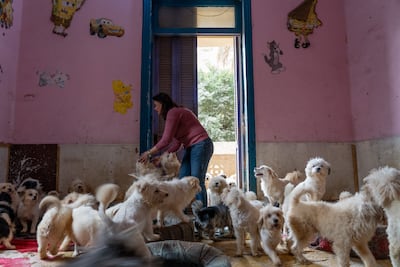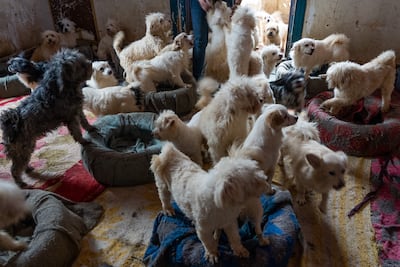Abandoned at a Cairo rubbish dump by her owner, Amal, 3, a disabled miniature griffon, was unable to chase her owner as he walked away.
Such stories are becoming typical as Egyptians sacrifice their pets in the face of record inflation.
While some owners are simply letting their dogs out on to the streets to fend for themselves, others are culling or injuring them, sometimes in brutal ways, Mira Gamal, the owner of a shelter in the affluent Cairo district of Heliopolis, told The National.
Ms Gamal, who has owned and managed the shelter for 11 years, said the numbers of dogs being admitted has increased dramatically in the last eight months.
In early 2022, she had about 250 dogs. Now she has more than 400.
She is also seeing a drop in the number of people willing to adopt.
“Adoptions from Egyptians have basically stopped, but I also get a lot of requests from outside Egypt and many of my dogs have been rehomed in the US or Europe,” she said. But now those numbers are dropping too.
Ms Gamal was told by overseas adoption agencies that because more Ukrainian dogs, displaced due to the country's war with Russia, are being rehomed abroad, fewer are being taken from Egypt.
“Before the war, we rehomed an average of 40 or 50 dogs each month, now between 15 and 20 are adopted,” she said.
Additionally, her operating costs, which include dry food, chicken skeletons and rice, have increased fourfold, she said.
“I am feeding more dogs than ever before, but also things are so much more expensive, I don’t know how long we can stay open at this rate,” she said, “Last year, I could feed all my dogs with around 1,500 pounds per day. Now I pay over 4,600 daily. And things are getting more expensive.”
Other expenses such as medication and grooming have also increased.
Ms Gamal funds her shelter through donations, which have dropped by 90 per cent, she said.

Some of the dogs in her shelter are in poor condition.
“Ninety per cent of the dogs we admit we find on the street,” Ms Gamal said.
“People report them to us and we retrieve them. These are pampered house dogs that are in no way equipped to deal with the street and in a lot of cases, by the time we reach them, it is too late to save them.”
Sometimes, owners bring them to the shelter and meet Ms Gamal.
Others are too ashamed, leaving them at the door with broken bones or ridden with disease.
Amal, who is currently recuperating at the shelter, is more fortunate than other dogs. Many die from injuries suffered at the hand of their owners or in the street after they were abandoned, Ms Gamal said.
Animal abuse remains an issue in Egypt and during her time running the shelter, Ms Gamal has seen some “shocking” cases.
Such incidents have worsened recently.
“In the past few weeks, there were some incidents that were shocking even to me,” Ms Gamal said as she scrolled through photos on her phone showing gruesome injuries suffered by dogs in her care.
“People think that street dogs are mistreated, but what many don’t know is how violent some owners can be towards their dogs behind closed doors.”
In one photo, a griffon was shown decapitated and dumped on the side of the road. In another, a husky is missing her two front legs after she severely broke them when her owner threw her off a third-floor balcony.
“Now that everyone is suffering from the high prices, I think many are taking out their frustrations on their dogs and doing unspeakable things,” Ms Gamal said.
“I had two dogs in a few weeks ago whose owner put them in a sack, doused it with gasoline, set it on fire and threw it into a large bin and walked off. A woman saw him, put the fire out and brought them to me.”

The shelter is located in her old family home near the scenic Heliopolis neighbourhood of El Korba, a converted four-storey apartment building.
She is currently saving to move the animals to a more open space, however, rents have also risen steeply in recent weeks.
She pays her workers’ salaries out of her own pocket.
Ms Gamal has been unfortunate in her entrepreneurial endeavours. She started a nursery in 2011, but was forced to shut it down after the first devaluation of the Egyptian pound in 2016 depleted her savings.
She also owned and managed a private tutoring centre that closed in 2020 during the Covid-19 pandemic.
Details on how to donate to Ms Gamal's shelter are on her Facebook page.

